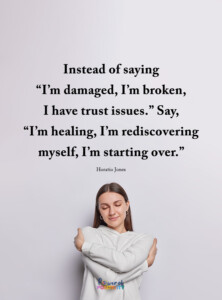Here are 10 things that you shouldn’t say to people with ADHD if you want to be more supportive.
Living with ADHD can be challenging, not just for those with the condition but also for the people around them. Attention Deficit Hyperactivity Disorder, or ADHD, is a neurodevelopmental condition that affects a person’s ability to focus, control impulses, and stay organized.
People with ADHD often face societal misconceptions that make their daily lives even more difficult. If you’ve ever found yourself unsure of what to say, or worried you might unintentionally say something harmful, this article will guide you.
Words matter, and by choosing a more supportive and understanding language, we can help people with ADHD feel more accepted and appreciated.
10 Things to Avoid Saying to People with ADHD
1. “Everyone has trouble focusing sometimes.”
Everyone indeed struggles with focus at times, but ADHD is much more than an occasional lapse in concentration. People with ADHD experience chronic difficulties in maintaining attention, and this struggle can occur even when they’re working on something they care deeply about.
The constant distraction and difficulty focusing aren’t fleeting moments of forgetfulness—they’re part of the condition’s core. Comparing ADHD to everyday distractions diminishes the reality of what these individuals experience daily.
It’s important to recognize that ADHD is a diagnosed disorder, not just a personality quirk or a phase.
2. “Why don’t you just try harder?”
Many people assume that those with ADHD aren’t putting in enough effort, but this couldn’t be further from the truth. People with ADHD often put in tremendous effort to stay focused and organized. Unfortunately, the disorder affects their brain’s ability to prioritize tasks and regulate motivation.
Telling someone with ADHD to “try harder” can be incredibly discouraging. It implies that their struggles are due to laziness or a lack of discipline when, in fact, ADHD can make basic organizational tasks significantly more difficult.
Instead of focusing on effort, it’s more helpful to support them by providing tools and understanding.
3. “Are you sure you have ADHD?”
One of the most damaging things you can say to someone with ADHD is to question their diagnosis. After a thorough evaluation, healthcare professionals can diagnose ADHD as a real medical condition.
Asking someone whether they’re “sure” they have ADHD can invalidate their experiences and make them feel misunderstood. This question also implies that ADHD is either overdiagnosed or not a real condition, both of which are harmful misconceptions.
Trust that their diagnosis is accurate and offer support without questioning their personal experience with the disorder.
4. “You just need to get organized.”
Organization can be one of the biggest hurdles for people with ADHD. It’s not that they don’t want to be organized; it’s that ADHD directly affects their executive function, the brain’s ability to manage and prioritize tasks.
Telling someone with ADHD to “just get organized” oversimplifies a complex issue. Executive dysfunction is a core symptom of ADHD, making it difficult to start, maintain, and complete tasks in an organized way.
Offering practical tools for organization, like to-do lists or apps, is a more helpful approach than giving unsolicited advice.
5. “ADHD isn’t real; it’s just an excuse.”
This phrase perpetuates a dangerous myth. ADHD is a neurological disorder, not an excuse or a label for bad behavior. It’s not uncommon for people with ADHD to hear that their condition is just a convenient reason to avoid responsibility.
However, research has shown that ADHD is linked to structural and functional differences in the brain. Dismissing ADHD as an “excuse” not only invalidates those who live with the disorder but also spreads misinformation.
A more compassionate approach would be to educate yourself about ADHD and understand the real struggles people face.
6. “Why are you so hyper?”
Hyperactivity is one of the more visible symptoms of ADHD, especially in children, but not everyone with ADHD exhibits this behavior. For those who do, being constantly called “hyper” can be embarrassing and stigmatizing.
Hyperactivity is often a coping mechanism for dealing with an overstimulated or distracted mind. Whether it’s tapping their foot, pacing, or bouncing from one task to the next, people with ADHD are trying to channel their excess energy.
Instead of drawing attention to their hyperactivity, it’s more helpful to create an environment where they can channel that energy productively.
7. “Can’t you just sit still?”
For people with ADHD, sitting still can be incredibly difficult, especially in settings that demand prolonged focus, such as classrooms or work meetings. Asking someone with ADHD to “just sit still” ignores the neurological basis of their restlessness.
Fidgeting and physical movement help them release energy and focus better. Many people with ADHD find it easier to concentrate when they’re moving or multitasking.
Instead of asking them to stop, offer alternatives like fidget tools or short breaks to move around, which can be more supportive of their needs.
8. “You’re just lazy.”
Labelling someone with ADHD as lazy can be incredibly hurtful. The difficulties they face aren’t due to laziness but rather a struggle with motivation, focus, and organization. ADHD makes it hard to prioritize tasks, initiate action, and maintain attention.
For someone with ADHD, what may look like procrastination is often a battle with executive dysfunction. Instead of labelling them, offer understanding and, if possible, suggest practical ways to break tasks down into smaller, more manageable steps.
Encouragement and patience go a long way in helping them manage their workload effectively.
9. “You’re so forgetful!”
People with ADHD often have issues with working memory, which means they may frequently forget appointments, tasks, or even everyday essentials like keys or wallets.
Telling someone they’re “so forgetful” can come off as accusatory and may make them feel inadequate. It’s important to remember that forgetfulness is a symptom of their disorder, not a reflection of their character.
Instead of pointing out their forgetfulness, offer gentle reminders or suggest tools like digital calendars or reminder apps that can help them stay organized.
10. “You’ll grow out of it.”
Many people still believe that ADHD is something only children experience and that they’ll “grow out of it” as they mature. However, ADHD is a lifelong condition.
While symptoms can change over time, and some adults may develop coping mechanisms, ADHD doesn’t disappear in adulthood. Many adults are only diagnosed with ADHD later in life, after years of struggling with focus, impulsivity, and organization.
Instead of assuming they’ll grow out of it, acknowledge that ADHD requires lifelong management and support.
Final Thoughts
ADHD is often misunderstood, and the people who live with it face challenges that many don’t see. What we say to people with ADHD can either help or hinder their journey. By avoiding these common, yet harmful, phrases, we can show empathy and support to those living with ADHD.
Remember, our words have the power to lift others or bring them down. Let’s choose to be encouraging, supportive, and understanding. When in doubt, ask yourself if your words will empower or discourage someone with ADHD. If they fall into the latter category, it’s worth finding a kinder, more compassionate way to communicate.
The post 10 Things You Should Avoid Saying to People with ADHD appeared first on Power of Positivity: Positive Thinking & Attitude.











